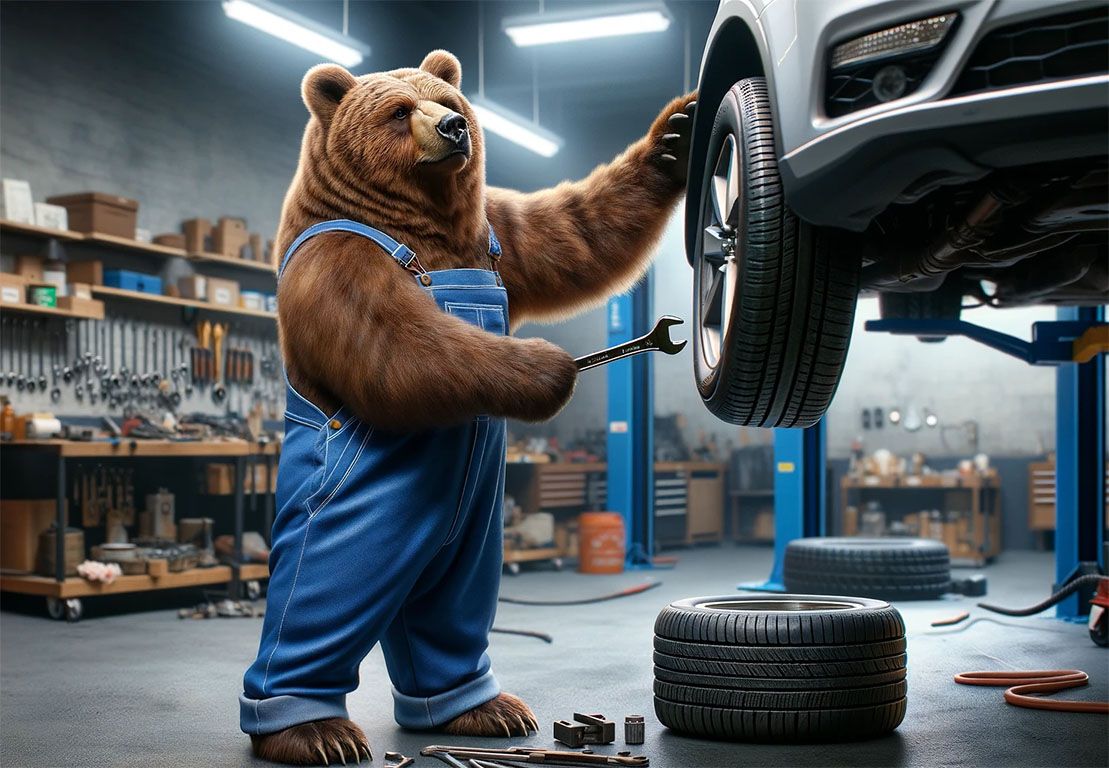
Threads on wheel bolts - always good to go
At BAER, we never tire of telling you about the versatility of threads – one such special product is the thread on wheel bolts. They quite literally hold your entire furniture together, can transmit movements, and help keep machines running and even move fluids. However, there are applications where threads are literally life-saving in the truest sense of the word, providing a firm hold and special properties for your safety. A perfect example of this is the thread on wheel bolts or wheel nuts.
Traveling at 90 mph on the highway and suddenly a wheel comes off? That would obviously be an absolute disaster. Wheel bolt threads help prevent such scenarios and are exposed to truly adverse conditions. They have to withstand not only shocks and vibrations but also constantly changing weather conditions, moisture, and temperature fluctuations .
Whether due to a breakdown or periodically in the spring and fall, you have probably changed a wheel yourself on one occasion or another. If so, you're already familiar with the threads on wheel bolts or wheel nut threads firsthand. Perhaps you've even pondered the significance of these small spirals. But we're sure we still have a few interesting facts up our sleeves that you might not be aware of. Let's dive in!
Thread on Wheel Bolt or Wheel Nut? Here's the Difference
The wheel hub acts as the connecting piece between the wheel and the axle. Modern cars use two different models for attaching wheels to the wheel hub. The location of the threads on a car wheel depends on which of the two methods is used in a vehicle .
Especially in Europe, wheels are mostly attached to the wheel hub using wheel bolts . This means that the wheel hub has several holes with an internal thread. For mounting, you need wheel bolts with the corresponding thread. So, when attaching such a wheel, you need to make sure that the holes with the wheel hub threads and the openings in the rim align perfectly. Only then can the wheel bolt threads properly engage.
The situation is different with the wheel nut model. Here, so-called studs with an external thread are directly attached to the wheel hub. During mounting, the wheel is aligned so that the bolts fit exactly through the openings in the rim. Now, the wheel nuts come into play. The thread on wheel nuts is an internal thread, which matches the external thread of the bolts. They can easily be screwed on to hold the wheel in place. Vehicles with wheels attached with wheel nut threads are more common in the USA or Asia. However, some German manufacturers, like Opel, still use wheel nut threads for many models.
A special case is racing cars, where wheels need to be changed very quickly during pit stops. This is achieved using a so-called central lock. Here, a single wheel bolt thread is enough to mount the wheel. Manufacturers like Porsche use this technique in regular road traffic. Due to the rotational movement in the central thread, there's a risk that the wheel bolt threads on the right side of the vehicle might come loose during driving. Hence, a left-hand thread is used for wheel bolt threads on this side.
Car Threads - These Threads are Found on Car Wheels
Threads on wheel bolts and wheel nuts must be able to withstand vibrations on various terrains without coming loose. It's no surprise that many wheel bolt threads are fine threads. Fine threads have a smaller pitch compared to coarse threads. Wheel bolts with fine threads, therefore, have a particularly high self-locking feature and don't need additional securing.
Depending on the manufacturer, the most common thread standards for wheel bolt threads are the metric fine thread MF or its American counterpart, the inch-based Unified National Fine Thread (UNF). The sizes of wheel bolt threads vary depending on the model. Popular sizes are MF 12 and MF 14, each with a pitch of 1.25 mm or 1.5 mm. For American wheel bolt threads, UNF ½” – 20 is a common choice.
Tap for Car Tire Threads
You might wonder why you should care about the size of the wheel bolt threads on your vehicle. If you do, you're among the lucky ones who've never encountered any problems while changing a wheel.
Unfortunately, the reality often proves different. After all, wheel bolt threads and wheel nut threads face a lot. Mud, rain, snow – a fine thread can fail under these conditions. If rust sets in on the wheel bolt thread, the annual struggle ensues: a wheel bolt simply refuses to come off. And it's always the last wheel that poses problems. Sometimes, with some force and/or persuasion, you might succeed, only to realize the wheel bolt thread got damaged in the process. To find a replacement, you could certainly pay a professional. Or you could solve the problem yourself if you know the thread size of the wheel bolt.
With the right screw tap , you can easily recut and clean the wheel bolt thread, wheel nut thread, and wheel hub thread from dirt and corrosion. And if you do this regularly, you'll less often encounter the problem of stuck wheel bolts. But be warned, in severe cases, you should still take your vehicle to a workshop and have the threads recut by a professional.
If you're looking to tackle the wheel bolt thread yourself, BAER, the tap manufacturer , has the right tool for you. In our online shop, we offer hand taps for metric or UNF fine threads, allowing you to gently repair your wheel bolt thread. If you have any questions, feel free to contact us. Our customer service is always here to assist you.
